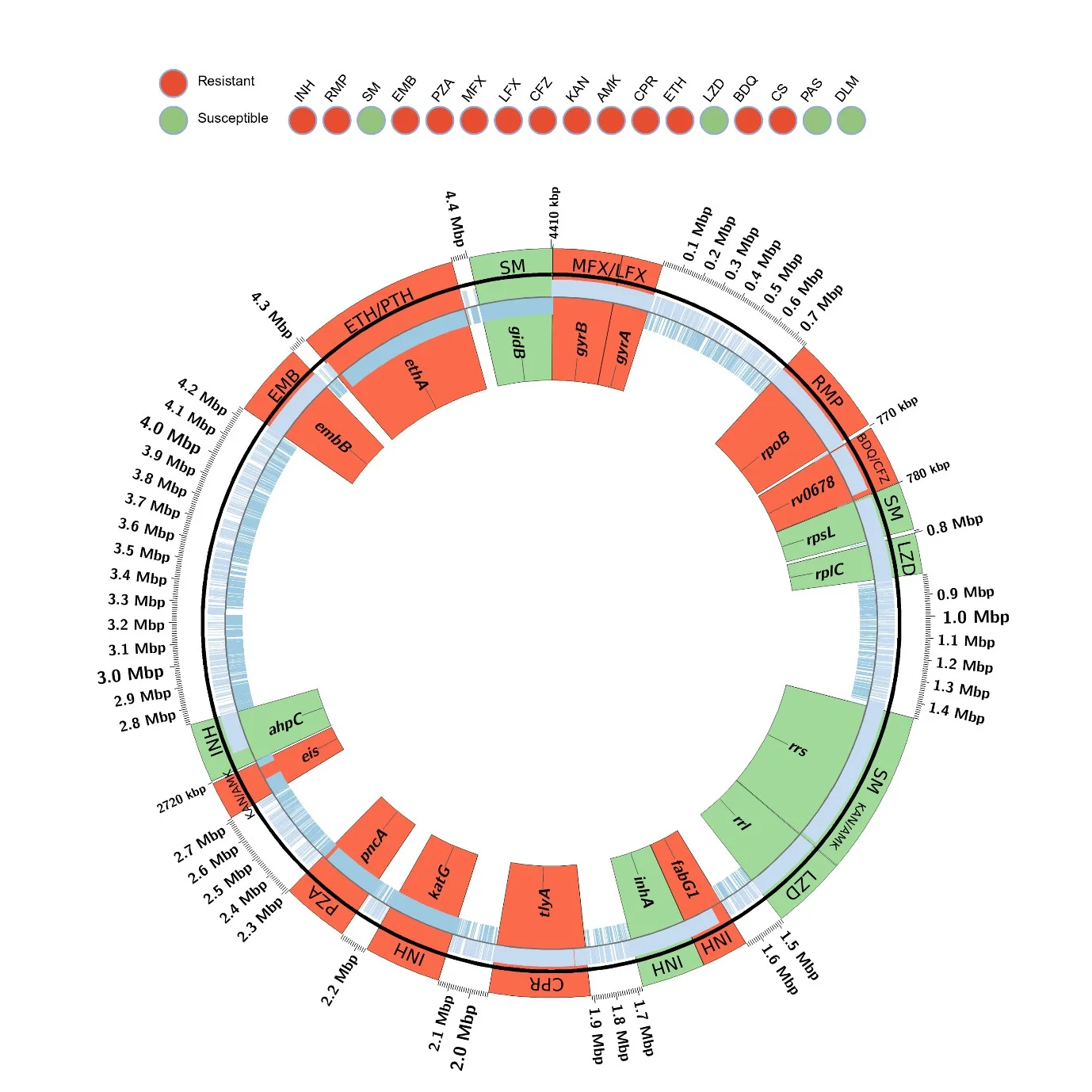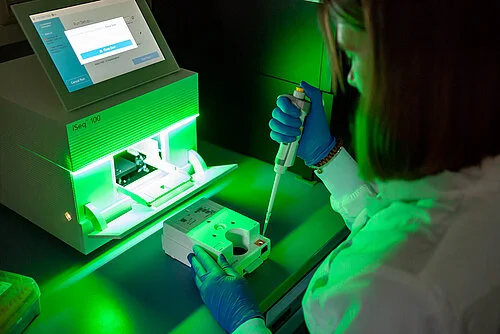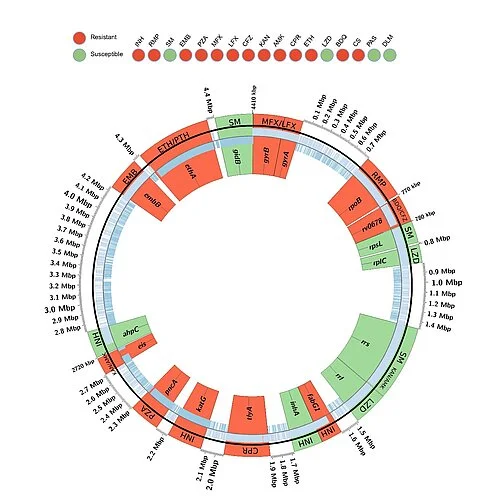When (new) drugs don’t work: Mozambique Faces Alarming Multidrug-Resistant Tuberculosis Epidemic
With one of the highest tuberculosis (TB) incidences (368 cases/100,000 population) in the African region, Mozambique is particularly affected by the TB epidemic. Drug-resistant TB is also a major problem, with an estimated 4800 new cases of multidrug resistant (MDR)/rifampicin-resistant TB in the country by 2021. Even more worrisome, researchers from an international consortium found a high proportion of fluoroquinolone resistance and increasing resistance to bedaquiline among MDR-TB strains, two key drugs in treatment regimens currently used to treat MDR-TB patients. In addition, the researchers documented the spread of “diagnostic escape” MDR-TB strains, carrying a rifampicin resistance mutation that cannot be detected by rapid molecular diagnostic tests currently in widespread use. The results of this study have now been published in Lancet Infectious Diseases.
Effective diagnostics and treatment of patients affected by MDR-TB are key for TB control. In Mozambique and other African countries, the WHO has recommended a nationwide use of the Xpert MTB/RIF Ultra test as a first line diagnostic test for MDR-TB to guide rapid MDR-TB treatment in line with the latest World Health Organization (WHO) guidelines.
Recently, the WHO recommended a new 6-month oral treatment regimen (BPaLM) composed of bedaquiline, pretomanid and linezolid plus moxifloxacin (in the absence of fluoroquinolone resistance) for the treatment of patients with MDR-TB. Although this regimen holds great promise, the emergence of fluoroquinolone and/or bedaquiline resistance described recently will threaten the success and longevity of the regimen.
In this study, led by scientists from the Research Center Borstel, Leibniz Lung Center and the National Institute of Health (Instituto Nacional de Saúde, INS, Mozambique), researchers used cutting-edge genomic sequencing technology on a set of rifampicin resistant (RR) Mycobacterium tuberculosis (Mtb) strains submitted to the National Tuberculosis Reference Laboratory in Maputo between 2015-2021 to study the transmission and evolution of drug resistant Mtb strains over time.
It has been found, that over 20% of the MDR Mtb strains in Mozambique already exhibit fluoroquinolone. Further, bedaquiline resistance is steadily increasing, from 3% in 2016 to 14% in 2021 among the MDR/RR Mtb strains. The data also indicate a high rate of recent transmission, especially of Mtb strains with high levels of drug resistance, such as pre-XDR or XDR strains.
“The rapid evolution of resistance and the efficient transmission of highly resistant M. tuberculosis strains represent a major threat to TB control in Mozambique and the
neighbour regions” says Prof. Niemann, study coordinator at the Research Center Borstel, and PI at the Leibniz Science Campus EvoLUNG, the Cluster of Excellence "Precision Medicine in Chronic Inflammation" (PMI) and the German Center for Infection Research (DZIF).
Equally worrisome is the spread of Mtb strains with a particular rifampicin resistance mutation (I491F), which was not detected by Xpert MTB/RIF Ultra and commercially available line probe assays. A large proportion of the I491F strains have a further resistance to bedaquiline, or even combined resistances to bedaquiline and fluoroquinolone. Comparison with strains from South Africa and Eswatini supports the cross border spread of I491F strains, a finding, that needs to be urgently investigated.
“Given the current diagnostic algorithms and treatment regimens, both, the emergence of rifampicin resistance due to I491F strains and bedaquiline resistance in general, may jeopardize efforts to contain the drug resistant TB epidemic in Mozambique” says Dr. Sofia Viegas, lead scientist and deputy general director at INS.
In a more general context, the study raises fundamental points regarding the development and introduction of new anti-TB agents or regimens. In the absence of effective diagnostics and direct translation of results into clinical decisions and resistance-adapted drug regimens, there is a high risk of rapid development of resistance, rendering newly developed medicines ineffective within a short timeframe. The study also calls into question the role of rapid molecular tests such as Xpert MTB/RIF in regions where the prevalence of “diagnostic escape” strains is high. The uncontrolled transmission of MDR Mtb strains in Mozambique and other parts of Africa represents a tremendous challenge for the fight against TB in the 21st century, and underlines the importance of effective diagnosis and TB surveillance based on comprehensive molecular methods such as sequencing technologies.
“Our research focuses on these topics, which we work on in national and international projects. Here, the translation of the basic research results into application is of particular importance” explains Prof. Niemann.
About the Leibniz Association
The Leibniz Association connects 97 independent research institutions that range in focus from natural, engineering and environmental sciences to economics, spatial and social sciences and the humanities. Leibniz Institutes address issues of social, economic and ecological relevance. Because of their importance for the country as a whole, the Leibniz Association Institutes are funded jointly by Germany’s central and regional governments The Leibniz Institutes employ around 20,500 people, including 11,500 researchers. The financial volume amounts to 2 billion euros. (www.leibniz-gemeinschaft.de/en/)
Scientific contact:
Prof. Dr. Stefan Niemann
Forschungszentrum Borstel, Leibniz Lungenzentrum
Parkallee 1, 23845 Borstel
+49 4537 188-7620
sniemann@fz-borstel.de
Press contact:
Britta Weller
Public Relation
Forschungszentrum Borstel, Leibniz Lungenzentrum
Parkallee 1, 23845 Borstel
+49 4537.188-2870
Fax: +49 4537.188-2600
bweller@fz-borstel.de
Resistance profile of a clinical Mycobacterium tuberculosis strain from Mozambique determined by whole genome sequencing. The colored panels show on the inner ring the gene names of the genomic areas (magnification 500x) which were screened for resistance conferring mutations and the respective antibiotic on the outer ring. At the outer ring the genomic position information in million base pairs (Mbp) is provided. Green: susceptible, Red: resistant. INH: isoniazid; RMP: rifampicin; SM: streptomycin; EMB: ethambutol; PZA: pyrazinamide; MFX/LFX: fluoroquinolones; CFZ: clofazimine; KAN: kanamycin; AMK: amikacin; CPR: capreomycin; ETH: ethionamide; LZD: linezolid; BDQ: bedaquiline; CS: cycloserine; PAS: para-aminosalicylic acid; DLM: delamanid.
Original publication:
Emergence of bedaquiline resistant tuberculosis and of multidrug-resistant and extensively drug-resistant Mycobacterium tuberculosis strains with rpoB Ile491Phe mutation not detected by Xpert MTB/RIF in Mozambique: a retrospective observational study. Barilar et al., The Lancet Infectious Diseases
DOI: https://doi.org/10.1016/S1473-3099(23)00498-X
About the Cluster of Excellence PMI
The Cluster of Excellence "Precision Medicine in Chronic Inflammation" (PMI) is being funded from 2019 to 2025 through the German Excellence Strategy (ExStra). It succeeds the "Inflammation at Interfaces” Cluster, which was already funded in two periods of the Excellence Initiative (2007-2018). Around 300 members from eight institutions at four locations are involved: Kiel (Kiel University, University Medical Center Schleswig-Holstein (UKSH), Muthesius University of Fine Arts and Design, Kiel Institute for the World Economy (IfW), Leibniz Institute for Science and Mathematics Education (IPN)), Lübeck (University of Lübeck, University Medical Center Schleswig-Holstein (UKSH)), Plön (Max Planck Institute for Evolutionary Biology) and Borstel (Research Center Borstel - Leibniz Lung Center).
The goal is to translate interdisciplinary research findings on chronic inflammatory diseases of barrier organs to healthcare more intensively, as well as to fulfil previously unsatisfied needs of the patients. Three points are important in the context of successful treatment, and are therefore at the heart of PMI research: the early detection of chronic inflammatory diseases, the prediction of disease progression and complications, and the prediction of individual responses to treatment.
Press office
fbuhse@uv.uni-kiel.de+49 (0)431/880 4682 https://precisionmedicine.de
Cluster of Excellence "Precision Medicine in Chronic Inflammation"
Scientific Office
Head: Dr. habil. Susanne Holstein Postal
Christian-Albrechts-Platz 4, 24118 Kiel, Germany
Contact: Sonja Petermann
+49 (0)431 880-4850, fax: +49 (0)431 880-4894
spetermann@uv.uni-kiel.de
Twitter: PMI @medinflame





